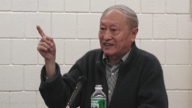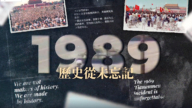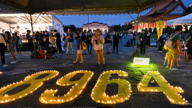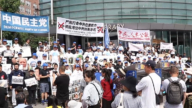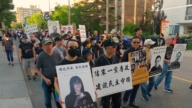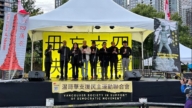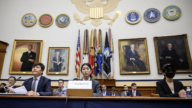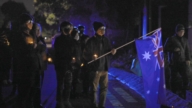【新唐人2014年02月05日訊】大年初三,是中國民俗祭奠親朋故友亡靈的日子。2月2號,來自中國大陸各地的30位民間人士,聚集在河南省滑縣,公祭前中共中央總書記趙紫陽、胡耀邦和「六四」死難者,也正式拉開了中國民間紀念「六四」25週年的序幕。
組織者選定在趙紫陽的家鄉——河南省滑縣,舉行公祭活動。一個長6米,高4米,寓意「六四」的巨型噴繪展板被豎立了起來。這個展板是以「六四」學生在天安門廣場請願的盛大場面為背景,並配上趙紫陽和胡耀邦的頭像。
來自大陸各地的30位民間人士到場祭奠,趙紫陽的兩名同鄉也加入祭奠活動。這一天,當地氣溫下降到零下13度,寒風刺骨,但還是吸引了數百名村民到場圍觀。
前廣州八九學生運動領袖陳衛,代表公祭者宣讀了公祭詞。
她說:「我們不會因為歲月的流逝而忘記那些死難者,他們是中華民族五千年文明史中層出不窮、精忠愛國的千千萬萬英烈的一部分,他們是現代歷史中為華夏反腐敗、反專制、爭民主、爭自由而英勇獻身的傑出代表。……遺憾的是,這一切由於六四的槍聲而戛然終止。」
公祭詞呼籲為「六四」正名。
前美國哥倫比亞大學訪問學者陳破空:「他們把民間和官方的人同時拿來紀念,實際上是對當今當權者的一個敲打。當年六四民主運動的主題是反腐敗、要民主、愛國,那麼今天,中國仍然面臨反腐敗的問題,腐敗不是越來越少,而是越來越多。」
公祭活動的牽頭人之一于世文,他在接受《美國之音》採訪時表示,中共當局並沒有阻攔或干擾公祭活動,只是派出便衣警察在現場附近監視。
陳破空指出,中共最高領導人習近平的父親習仲勳,是胡耀邦和趙紫陽的忠實跟隨者,今年,民間同時紀念胡、趙兩人,是希望能化解官民之間的僵局。
陳破空:「我想以陳衛和于世文為代表的這些民間人士所做的大膽的創舉,是希望打開中國這麼一個殭化的局面,希望在六四事件上,找到一個突破口,來解決中國積重難返的這些問題。」
不過,于世文指出,中共當局沒有干擾他們的公祭活動,並不表明放鬆了對民運和異議人士的打壓,只是表明中共新的領導層的思維方式發生了改變。
據了解,去年清明節前,以陳衛、于世文牽頭的這批民間人士,就曾經到習近平的仕途發祥地——河北省正定縣,舉行公祭「六四」死難者的活動。結果,事後于世文被當局扣押詢問了24個小時。而與「新公民運動」創始人許志永案有密切相關的民主人士趙常青,也在參加這次公祭活動後不久被逮捕。
除了大陸民間舉行公祭活動,海外紀念「六四」25週年的活動也如火如荼的展開。紐約、臺北、北京三地民運人士,今年元旦,啟動「天下圍城」活動,開始了接力絕食。另外,美國蒙大拿大學退休教授斯蒂芬•萊文(Stephen Levine)也在白宮網站上,發起紀念「六四」的簽名活動。
陳破空:「六四天安門事件已經過去了四分之一個世紀,而六四作為一個很明顯的正邪之分,學生和民眾所代表的反腐敗、要民主訴求,和官方代表的要獨裁、要腐敗那種對立,在這種情況下,官府對手無寸鐵的人民實行屠殺,這樣的正邪分明、一目瞭然,所以人民都期待像六四這樣的事情能得到和平公正的解決。」
陳破空指出,經過了25年,當年沾上「六四」鮮血的那些官員,幾乎都已不在位,中國百姓更期待當今領導人能夠正視這段歷史,解決這樁歷史血案。
不過,趙紫陽的秘書鮑彤,日前被當局限制。
曾參與八九民運的旅美民主人士楊建利向《美國之音》表示,25年過去了,中共當局仍然恐懼各界對「六四」的發聲,這是一個制度性問題,制度不改變,類似問題就會一直發生。
採訪/常春 編輯/陳潔 後製/鐘元
Chinese Activists Hold Commemoration to Mark 25 Years Since June 4 Incident
The third day of Chinese New Year is traditionally when
Chinese pay homage to the souls of relatives and friends.
On February 2, a public memorial took
place in Hua County, Henan Province.
This was to commemorate former Communist Party
General Secretary Zhao Ziyang, Hu Yaobang, as
well as victims of the Tiananmen Square Massacre.
This also signalled the start of the 25th commemoration
of the June 4 massacre by the general Chinese public.
The memorial took place in Hua County,
Henan Province, where Zhao Ziyang was born.
A giant panel 6 meters long and 4 meters high,
representing June 4, was displayed at the memorial.
It displayed a scene of student protests in Tiananmen
Square, and pictures of Zhao Ziyang and Hu Yaobang.
30 people from across China visited, including
two people from Zhao Ziyang’s hometown.
The memorial took place in temperatures
that were 13 degrees below zero Celsius.
Despite the bitter winds, the memorial
went on to attract hundreds of villagers.
Chen Wei, a former student movement leader
from Guangzhou, read out a memorial address
on behalf of the public memorial service.
Chen Wei: “We will not forget the
victims with the passage of time.
They are patriotic heroes as part of the
5,000 years of Chinese civilization history.
They are the outstanding representatives
of contemporary Chinese people.
People who devote and sacrifice for democracy and
freedom in the fight against corruption and authoritarianism.
Unfortunately, this was abruptly terminated
due to the gunfire in Tiananmen Square."
The memorial address called for
rectification for the June 4 massacre.
Chen Pokong, former scholar, Columbia University:
“It is a blow to the current leadership that they
commemorated activists and officials at the same time.
The June 4 student movement was about
anti-corruption, calling for democracy and patriotism.
China today still faces the problem
of corruption, and has become worse."
Yu Shiwen was also an organizer of the memorial service.
Yu Shiwen told Voice of America that the Chinese
authorities didn’t obstruct or interfere with the activities.
They did have plainclothes police surveillance in the vicinity.
Chen Pokong points out that current leader
Xi Jinping’s father, Xi Zhongxun, was a faithful
follower of Hu Yaobang and Zhao Ziyang.
The public memorial is hoped to resolve the
impasse between the regime and the people.
Chen Pokong: “I think the NGO represented by
Chen Wei and Yu Shiwen have taken a bold initiative.
They hope to make a breakthrough to solve these
diehard problems in China, such as the June 4 incident."
However, Yu Shiwen indicated that even though the authorities
did not interfere with their memorial activities, it does not mean
the suppression of pro-democracy movement and dissidents
have been relaxed,
but rather that the new leadership has a different way of thinking.
It is understood that last year Chen Wei and Yu Shiwen had
held a public memorial service for the June 4th victims at
Zhengding County, Hebei Province where Xi Jinping started
his political career.
After the memorial, Yu Shiwen was detained for 24 hours for
interrogation.
New Citizens’ Movement activist Zhao Changqing was also
arrested soon after the memorial service.
Events commemorating the 25th anniversary of
June 4 have also taken place outside of China.
At New Year, activists from New York, Taipei and Beijing
started a hunger strike, as part of a ‘World Siege’ campaign.
Professor Emeritus Stephen Levine from
the University of Montana launched a
petition on the White House Website.
The petition, “Calls For Recognition
Of Tiananmen Massacre Victims."
Chen Pokong: “Even though it’s been a quarter
of a century, the Tiananmen incident provides
an obvious distinction between good and evil.
The Chinese people and the students were
demanding democracy and anti-corruption.
This is the opposite of dictatorship
and corruption of the regime officials.
The massacre of defenseless people
conducted by officials is clearly wrong.
People are hoping for peace and justice
in resolving the Tiananmen incident."
Chen Pokong further suggests that after
25 years, the officials who were stained with
blood during June 4 have nearly all retired.
People hope the current leaders will face up to
that period of history, and provide some resolution.
However, Zhao Ziyang’s secretary Bao Tong
has recently been restricted by the authorities.
Yang Jianli was a participant in the 1989 student protests.
Yang Jianli told Voice of America that 25 years
later, the Chinese authorities still fear any
voices that are outspoken about June 4.
This suggests that it is an issue of the system, and similar
problems will continue as long as that system remains.
Interview/ChangChun Edit/ChenJie Post-Production/ZhongYuan


